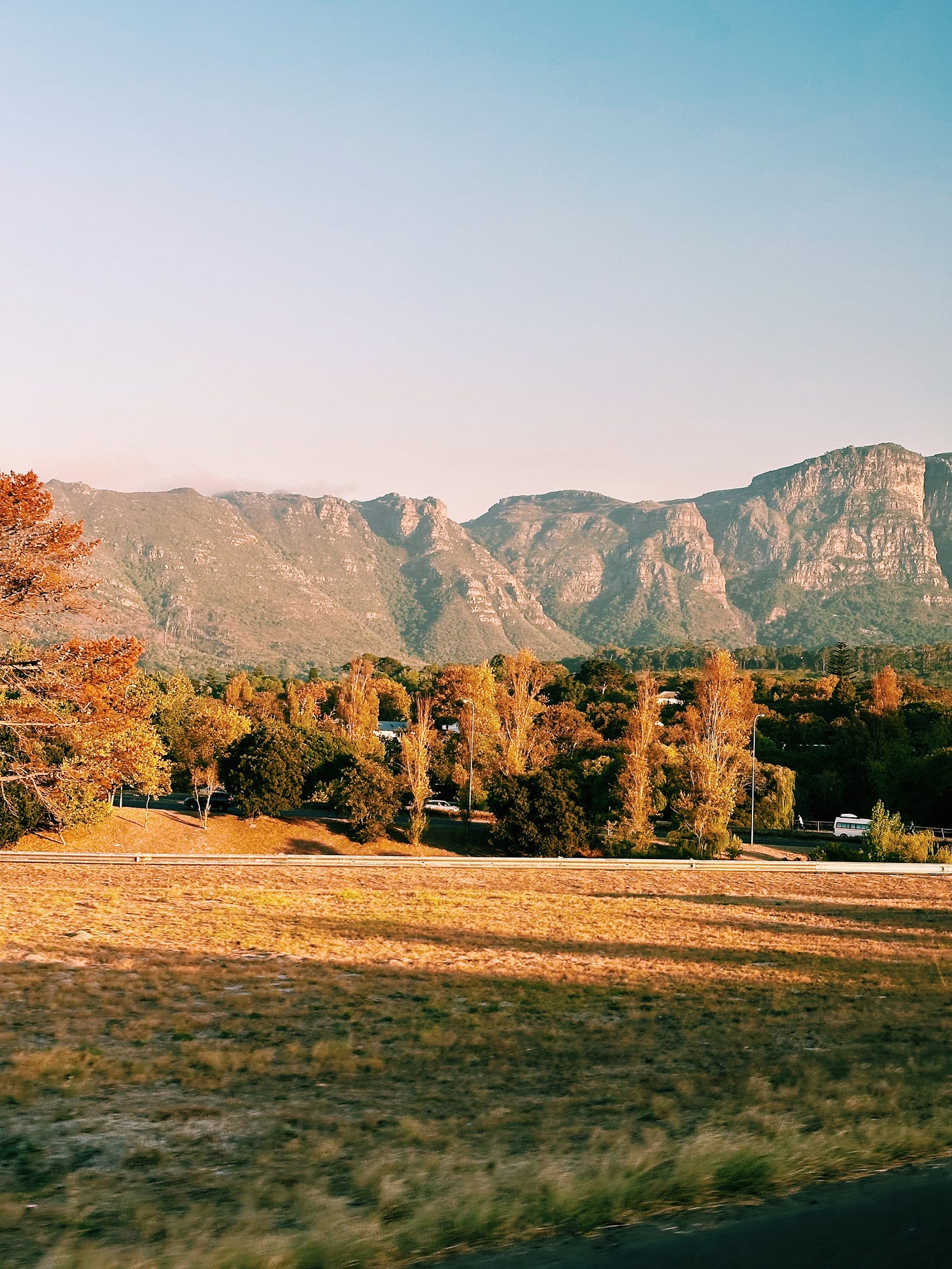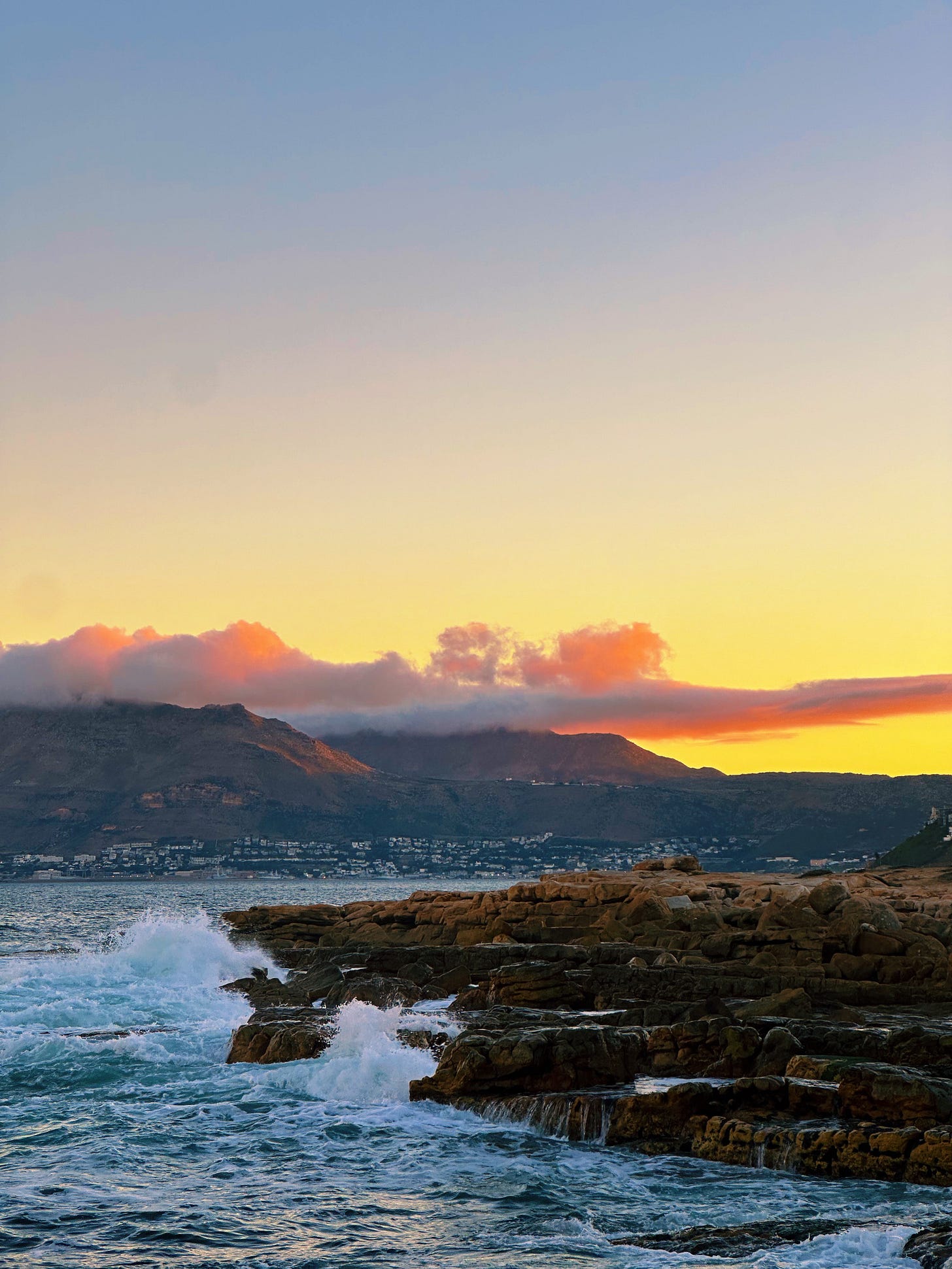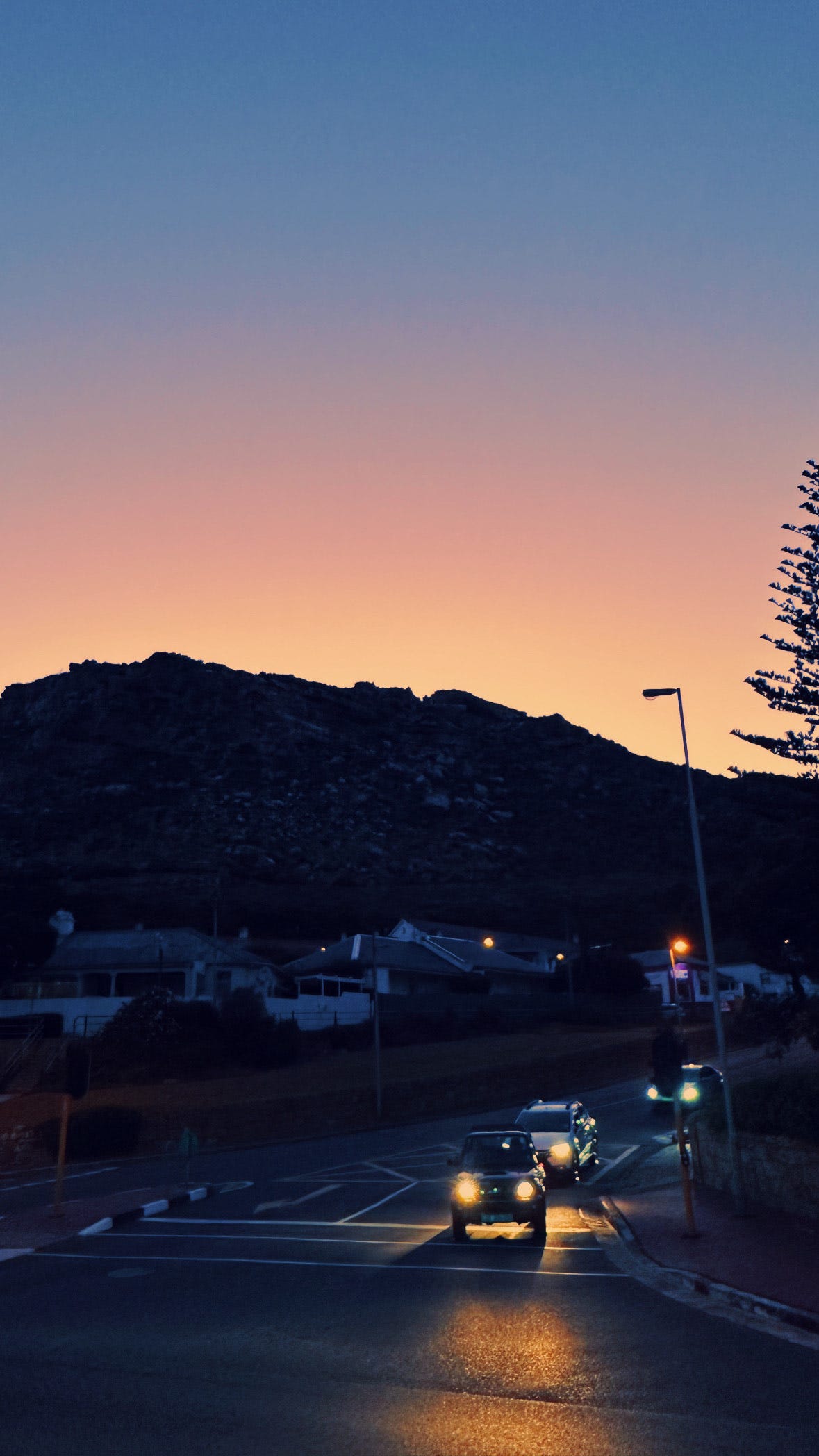The morning of my flight home to South Africa, I thought my Dad was going to die. It was just past midday. Central station reeked of hot chips, body odour, and the acidic tang of urine collecting in the cracks of a tiled floor. People walked with urgency and no linear trajectory. It made taking a side exit to another platform a precarious affair, a game of leap-frog over legs and instruments and groceries wheeled in prams. The escalator was a moment of respite, a brief pause amidst such chaos. The machinery was there to carry us skyward to platform 23. The journey was only short but within that space all the badness crept in.
I always pictured these things to be something out of a cartoon. I thought a fall was meant to look like flailing limbs and jerky movements as an exclamatory bubble popped from the lips, legs turning over in double-time just to find secure ground below. The reality was far more cruel. It was the most innocent of stumbles and yet it produced the loudest fall.
Even now, it sounds so trivial - to think that was the cause of it. But that’s all it was: Dad felt off balance, lost his footing and fell backwards. Then he rolled down, before coming to lie like roadkill as the jagged teeth of the escalator kept chomping on his neck and body. Within seconds, blood began to seep through his clothing, blooming like ink on wet paper. I heard a scream so guttural it was like the sound itself was still clawing its way out of the throat from which it came, but when my head snapped to Dad, he was dazed. It was Mum, her body bent over Dad’s horizontal form, pleading for anyone to come help. We tried but couldn’t lift him up. The way he was positioned, the pace of the escalator, the wounds to his body - we couldn’t manage it.
As Mum continued screaming, I ran to the top of the escalator where a whole crowd had gathered. It felt like being dragged under a wave, a momentary obstruction of most senses save for the familiar presence of bodies beneath water. You don’t know to whom which parts belong, but you can feel the kicks received to the abdomen and leg, the elbows that smash into your face and the hands that grapple for something to hold onto. Coming up for air, I pushed my way back to the front and found a guy with his phone out, blocking the escalator so he could get the best shot of the struggle.
“Stop filming! Please stop! That’s my fucking Dad!” I wanted it to come out as a snarl, holding all the aggression you’d expect of a lioness protecting its cubs. Instead, the words sputtered out like a sprinkler on the last of its cycle, a fine mist of spittle generating little more than a whisper. His eyes grew wide as they took in my expression - something manic and scared - and he put his phone down. He uttered an apology and crept to the back of the crowd. I never saw him again.
Someone below heard Mum’s screams and stopped the escalator. Tradies rushed down the steps where they managed to pick up Dad and carry him to a bench on the platform. A young guy called a paramedic who jogged towards us carrying a first-aid kit so large it had the appearance of a toddler stuffed into a sack. Mum was holding onto Dad, removing his blood-stained jacket and shirt so the paramedic could dress wounds. People stood around us, but it was different this time. They were trying to provide some kind of privacy, a shield of bodies protecting us from prying eyes. A woman in scrubs came up to me. “Is he going to be alright?” she asked. I didn’t know what to say.
She had a backpack and Hokas on. She took the former off and produced a water bottle, holding it out for me. I shook my head and let out a “no thanks.” She put her arms around me and I apologised profusely while sobbing into her long blonde hair that smelled like lavender. I heard the train come and she pulled away, not before giving me an extra squeeze.
That’s what it was like for the next hour. The trains kept coming and as passengers arrived at the platform, they circled the bench where the paramedic worked and Dad came to and Mum and I kept exchanging looks that said I don’t know how to do this without you. Some people stayed with us, missing their trains just so they could keep distracting us from Dad’s back that looked like it had been mauled by a wild animal. His skin already bore the resemblance of a twilight sky, a swirl of deep blues, purples, and reds where blood throbbed beneath the surface.
I watched the paramedic, kneeling on the filthy station floor on which I sat. He pulled Dad’s clothes off slowly, examining the flesh before turning to his bag to retrieve what was needed. He was so tender, so soft. He did it all with such care. I looked at Dad, his eyes weary but wide. The adrenaline had worn off. He wasn’t so confused as he was scared. I’ve been present for all the chemo treatments and blood transfusions, all the overnight stays and heavy phone calls. Even with his cancer, he’s always stayed so young, bearing the personality of a kid trapped in a giant’s body.
There at Central Station, it was like he aged overnight. How had I not seen it? All these signs I had missed, stored in the body like artefacts in a tomb. For the first time, it was like our roles had shifted. He was always the person whose advice I sought first and whose opinion mattered most. I now felt like the parent, sensing the shame radiating off his being as his job was reduced to sitting still. I wanted to reach out and hold him, to say something that carried more weight than the “I love you” that already passed so easily between us. I wanted to put him at ease. Instead, I watched the trains come in, one after the other, wondering if I would miss my flight.
The awareness that nothing stops, that time lurches forward at an alarming rate, that what is the present is already colliding with the past tense, is far from a revelation. We already know this. Most of us have lived in cities where the bar that held our first crushes and meet-cutes and played that band whose music we always come back to is nothing but a retail store now. Those restaurants that were family establishments have been swallowed up, construction spitting out something bland and faceless. Sometimes it creeps upon you slowly like the faint trace of a wrinkle pushing up through the skin before you’re having to adjust your makeup application to its permanence. One heartbreak hurtles into the next. You envision a future with someone and by the time the broad brush strokes are down, you’ve let them slip through your hands like sand.
I look at Mum and feel her fatigue. To be witness to disease, a partner in crisis, and a participant in love. It is exhausting work. Nothing ever lets up. There is never any respite. Dad has treatment then gets better, Dad has blood work that suggests another scare. Something else is found, another part of the body dissected. Nothing stops but imagine if it did? Imagine if she could hit pause, take the hand of the man she loves and run back through time. Or perhaps they would choose to stand still, to have the hours tick by in which nothing happened. Just one day. One ordinary, uneventful day.
I cried for the whole twelve hours to Joburg. They dimmed the lights in the cabin to force sleep upon the passengers and blasted the air-con so we sat shivering under the paper-thin blankets supplied. I’d close my eyes and instantly be taken back there. It wasn’t so much Dad’s physique on the escalator that got me but Mum’s screams. They rattled my brain like a dance track on loop. I’d feel tears on my cheek and open my eyes quickly in the hopes no-one saw but every time the cabin crew came round offering trays of vacuum-packed fish curry and rocks for bread rolls, they avoided eye contact.
On my way to Cape Town, my phone pinged with messages from my Aunty and cousin. It had been eight years since I was back home. Ours should’ve been a text exchange of excitement and heart-shaped emojis. Instead, it was about doctors and hospitals and Dad’s condition, all of us working to lock in the necessary appointments ahead of his arrival.
The last time I was home was in the summer of 2017. The drought had proved insufferable, refusing to leave like a toddler sent to bed. For months, the water supply dwindled until we were told to prepare for ‘Day Zero’ when the taps would be turned off. We drove to every Checkers but the shelves were already emptied of water bottles. The desperation was claustrophobic; it stuck to you like your week-long unwashed clothes and sweat-stained skin. Restaurants didn’t serve water, the toilets wouldn’t flush, what water remained was used for a communal sponge bath at the sink. Our home sat high against the mountain flanking St James Beach and from the balcony we watched the flock of people lining the sidewalk for miles, toting their jerry cans, buckets, and bottles. Directly below us, a hole in the rocks had caused water to trickle out and for hours people waited until it was their turn to fill up and begin the long journey home on foot. The next week we found out there was salmonella in the water. Most everyone had gotten sick.
I passed that same spot and the water no longer spurted from the rock. If it had, it wouldn’t have drawn a crowd. The supermarket shelves were stocked, the water poured freely in cafes and establishments, showers were something to luxuriate in. The city had simply found one crisis to replace another. The hospitals were now shut. Trump’s orders to halt funding to USAID programs meant there were no longer medications or vaccines to treat those in need. They lay outstretched on the road and cowered under bus stops. Doctors and nurses were without jobs. Those pioneering new vaccines for HIV/AIDS were forced to halt their clinical trials. They’d have to call those involved in the study and tell them they couldn’t receive the life-changing injection, that the whole thing was scrapped. The shame they felt, the responsibility for these lives now upended, it trapped them like a snare.
In the kitchen, my cousin and I made dinner plans. After the stress and chaos of my departure, we’d keep it simple. Salads and a roast chicken, Uncle Pop and Aunty Sue at the table. Before she left, she turned and told me to prepare myself. I didn’t understand what for. “For how old Uncle Pop is,” she said. Apparently he wasn’t the same man I had in my head; the brash journalist who reported in Afghanistan, who would dance across the rocks at our beach house in uMhlanga until he stood precariously amongst the waves, a solitary figure with his fishing rod and newspaper.
When I did see him, he didn’t look all that different to what I remembered. His body was still thin and cloaked in his uniform of double denim, a constellation of sun spots visible on his tanned skin. He smelt like cigarettes and beach hair. He moved slower, the fishing rod that typically held a permanent place under his arm was now replaced with a walking stick. Still, he was sharp as a tack. He sat back and let the conversation unfold, never needing to be the loudest in the room. He saved up his words carefully and as a result, any time he spoke everyone grew silent as if in the presence of a guru. What was uttered was always hilarious and profound, a man whose storytelling capabilities were unmatched. Dinner was everything I expected it to be, a love cocoon I had missed beyond words. But when Pop excused himself to smoke, the reaction from my cousin and Aunty was no longer nagging but pleading. The mood changed instantly and I sensed that familiar desire: a break, a pause, just one day when nothing happens.
If you set your alarm early enough and wake before the garbage trucks have begun their neighbourhood crawl, it does feel like the world is yours for a small moment in time. It holds the key out to you and says, here, it’ll be our little secret. When all of us were finally in Cape Town and the downstairs walls rattled with Dad’s snores, I crept from my bed upstairs and went out into the street.
The mountains looked like mist hovering over the horizon, a haze of deep blue that kissed a marbled sky. St James smelt like freshly washed hair, a heady mix of sea salt and sweet coconut. With the city asleep and the only soundtrack one of crashing waves, I felt like a boat adrift in the shadows. I strode down the length of Main Road and came undone by the beauty of home.
There are a million reasons to run and all manner of times to do it but when the streets are empty and the route yours to choose, it can feel like an extended inhale, a momentary pause from the chaos. It’ll all be there when you get back, but for now it’s just you and the breath that fans before your face. You can run fast and you can run long or you can do both together. Regardless, pain arrives. It’s a familiar presence, a friend of sorts, a trustworthy companion when it comes to miles shared underfoot. When it first rears its head, it can be disconcerting. You struggle against it, you look for ways to drive it away. Pace and stride-length are adjusted, an energy gel consumed and water splashed across the face. But at some point you give in, understanding it’s not going to get worse or better. Now a constant, it just is.
When I get back to the house, the sun sits high. On the terrace, Dad sits and sips a coffee while Mum rests her head against his shoulder, feet dangled over the couch. My nieces are up. Both look like they’ve been electrocuted, sporting a crown of fine hair that’s spiked and curled in every direction. Inside, the kitchen table is a mess of baby food and half-nibbled fruits. Croissant flakes douse the counter like dandruff. My brothers can’t remember which drawers hold the cutlery and which cupboards the mugs. Nothing stops. It’s OK, I think. I think it’s OK that it doesn’t. Like any run, you can slow down, you can come up for air, but the only way is through. The pain is a companion of sorts. It’s not a question of love, it’s tangible proof.
hi friends, i know it’s been a little while since the last Foot Notes but sometimes we all need a break. i’m grateful for those who are still here and the ones that stuck around. there is good stuff coming, there are many people whose stories i want to share. and for my paying subscribers - content just for you will come soon. regular schedule to resume next week but in the mean time, sending much love x







